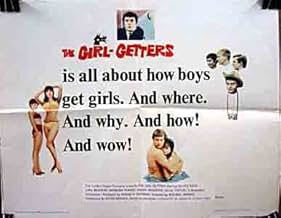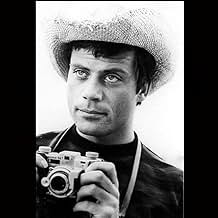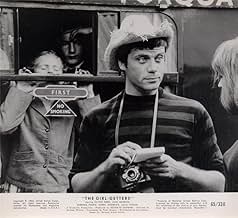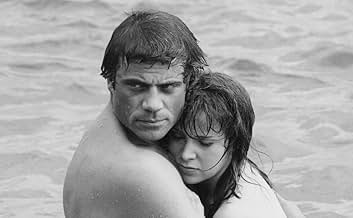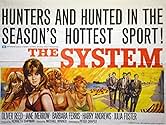IMDb RATING
6.5/10
927
YOUR RATING
In a seaside town, local men pursue summer tourists for casual flings. Their leader, a photographer named Tinker, unexpectedly falls for a wealthy model, realizing the dynamic of exploitatio... Read allIn a seaside town, local men pursue summer tourists for casual flings. Their leader, a photographer named Tinker, unexpectedly falls for a wealthy model, realizing the dynamic of exploitation may be reversed.In a seaside town, local men pursue summer tourists for casual flings. Their leader, a photographer named Tinker, unexpectedly falls for a wealthy model, realizing the dynamic of exploitation may be reversed.
John Porter-Davison
- Grib
- (as John Porter Davison)
Gwendolyn Watts
- First Class Girl
- (as Gwendoline Watts)
Stephanie Beaumont
- Marianne
- (uncredited)
Victor Brooks
- Club Manager
- (uncredited)
Susan Burnet
- Jasmin
- (uncredited)
Jeremy Burnham
- Ivor
- (uncredited)
- Director
- Writer
- All cast & crew
- Production, box office & more at IMDbPro
Featured reviews
One of Oliver Reed's early works to remind us of his lost but not forgotten talent (Died 2nd May 99)
With the Girl-Getters or The System as it was shown to be when i lived in the UK is a tale of misspent youth on a Southern England coastal town. Like many of these towns the folk lay dormant for most of the year until the summer comes, and with it trade in the form of tourism. This was in a time before the package tour and the Costa-del-slosh that most of the young men have reverted to. This was a time when a virile young male spent his days prowling the promenade in search of his prey. The system was a cunning plan thought up by Tinker played brilliantly by the late Oliver Reed, was to a method of getting as much action of the female variety as possible. I will not ruin the surprise by revealing what the system exactly entails but needless to say it works with measured success. Until that is Tinker falls fowl of his own tricks and has his heart broken by a more fiestly young lady with a nice sports car and a wealthy father. The Soundtrack is particularly commendable as can be gleaned from the opening titles, and continues with a particulary mod beat. I particularly enjoyed the film as I am of the same age as Reed in the film and it is good to see that little has changed in our quest for summer fun except for perhaps the fashion of the time and hairstyles. Or has it.
You might think that by 1964 the world was all swinging sophistication, but no it was like this, I remember. I had recently started working, in a bank. It was hand written ledgers and an outside toilet! Yep, life revolved a fair bit around getting girls and then making sure you didn't get them pregnant and then 'having to get married'. Everyone is s bit too old here, of course, although David Hemmings looks like a little angel. Oliver Reed puts in a good performance as the leader although it's hard at the end to take his more introspective ponderings. Great direction by Michael Winner, there not many people have said that, and the movie speeds along with some excellent sequences, especially the wedding celebration on the beach, played more like a wake. Winner is an under rated director, he did a couple of others of this ilk, then I like his Innocents and there is Death Wish. I liked the hated Death Weekend but in general his career went downhill and it stops people giving the earlier films a chance. Well worth watching, if only to appreciate that the mid 60's in Britain were still much like the 50's, except with teenagers.
"The System" was both the first time director Michael Winner had ventured away from films featuring pop groups to something more serious and representative of the 60s, and the first time Oliver Reed had a lead role that wasn't in a Hammer horror. The scene where you see him for the first time in the camera range gives you some idea of what kind of screen presence he had before the booze became more important than the image. As Tinker the photographer, the leader of a randy gang in Brighton, Reed is exceptionally good, and also in the cast are John Alderton, David Hemmings, and Andrew Ray, all offering good support. The film gets under the skin of the decade and manages to be interesting to watch as well.
A blast from the past for those young in the early 60s is the belated DVD release of THE SYSTEM (US Title: THE GO-GETTERS) made in 63 and released in 64 - when I saw it aged 18 when it would have played here in the UK for a week on release as part of a double bill and then promptly vanished without trace until I saw the DVD yesterday. It comes with a nice 8 page booklet too setting the film in context which is a model of its kind, if only more DVD re-issues followed suit!
The film directed by Michael Winner with marvellous black and white photography by Nicholas Roeg is set in one of those English seaside towns following a gang of young men, led by the then very charismatic Oliver Reed, and their amorous pursuits over the summer and is actually a perfect compendium of European cinema trends of the time - there are Antonioniish moments (the tennis game here has a real ball) and it ends like LA DOLCE VITA in a Felliniesque dawn at the beach as the disillusioned characters realise the summer is over. The script by Peter Draper anticipates elements of DARLING and BLOWUP.
It sports of course a great cast of English young players of the time (Barbara Ferris, Julia Foster, Ann Lynn, John Alderton) as well as reliables like Harry Andrews. Of the young cast David Hemmings (rather in the background here) would two years later personify the 60s when chosen by Antonioni for his lead in BLOWUP. Jane Merrow (Hemmings' girlfriend of the time, and a replacement for Julie Christie who was doing BILLY LIAR) is perfect as Nicola the rich girl whom Reed falls for but she plays the game better than he does. I got to meet her myself once ...
Winner of course may be rather a figure of fun now, one forgets that in the 60s before those DEATH WISHES etc his films caught the moment as well as any by Richard Lester, Losey, Schlesinger or the underrated Clive Donner, with titles like THE JOKERS and I'LL NEVER FORGET WHATSHISNAME where Reed was meant to be his character from THE SYSTEM five years later.
In all its a perfect early 60s movie full of sounds and faces and the mood of that time before the 60s happened. For anyone interested in English cinema or remembers the era, its a real pleasure to see again 40+ years later !
The film directed by Michael Winner with marvellous black and white photography by Nicholas Roeg is set in one of those English seaside towns following a gang of young men, led by the then very charismatic Oliver Reed, and their amorous pursuits over the summer and is actually a perfect compendium of European cinema trends of the time - there are Antonioniish moments (the tennis game here has a real ball) and it ends like LA DOLCE VITA in a Felliniesque dawn at the beach as the disillusioned characters realise the summer is over. The script by Peter Draper anticipates elements of DARLING and BLOWUP.
It sports of course a great cast of English young players of the time (Barbara Ferris, Julia Foster, Ann Lynn, John Alderton) as well as reliables like Harry Andrews. Of the young cast David Hemmings (rather in the background here) would two years later personify the 60s when chosen by Antonioni for his lead in BLOWUP. Jane Merrow (Hemmings' girlfriend of the time, and a replacement for Julie Christie who was doing BILLY LIAR) is perfect as Nicola the rich girl whom Reed falls for but she plays the game better than he does. I got to meet her myself once ...
Winner of course may be rather a figure of fun now, one forgets that in the 60s before those DEATH WISHES etc his films caught the moment as well as any by Richard Lester, Losey, Schlesinger or the underrated Clive Donner, with titles like THE JOKERS and I'LL NEVER FORGET WHATSHISNAME where Reed was meant to be his character from THE SYSTEM five years later.
In all its a perfect early 60s movie full of sounds and faces and the mood of that time before the 60s happened. For anyone interested in English cinema or remembers the era, its a real pleasure to see again 40+ years later !
Given director Michael Winner's critical reputation today, it's hard to remember that he, too, once enjoyed a moment in the sun. For a brief period at the start of the 1960s, the director received good reviews on both side of the Atlantic, most especially from the American critics impressed by his ability to adapt very contemporary subject matter and make it appeal to an international youth audience. In particular, The System, followed in turn by The Jokers (1966), and then I'll Never Forget What's'isname (1967), attracted attention. All three films starred Oliver Reed, cast after Winner had spotted the potential of the actor who had previously appeared in Hammer horror films.
Overshadowed by the slackness and crudity of some of his later, more ambitious projects, these early titles are overlooked. But for The System, at the time of its release, Newsweek praised Winner as the unheralded director of a "consistently intelligent and often brilliant low-budget import." Seen today it can be identified as part of a group of films that have interesting anticipations of each other within British cinema. In the film Reed plays 'Tinker' a seaside photographer, the charismatic leader of a group of young men seeking sexual conquest at the seaside.
The System, unsubtly re-titled The Girl-Getters for the USA, was felt to be controversial in subject matter at the time, although by today's standards it is pretty mild. Reed had earlier appeared as a tearaway in another resort-set movie, Losey's cult item The Damned (1961); in the present film it is almost as if the young thug from the previous story has moved on a little to a newly precarious living, at least as far as he might be able to. The character Tinker is much more self-confessional in the present movie, and to that extent has attracted comparisons to Alfie (1966), which took the self-examination of a moral vacuum to a much greater level. The System co-stars some well-known names: John Alderton, Harry Andrews, and Derek Nimmo all appear.
Originally, Julie Christie was slated to appear too as Tinker's posh love interest Nicola, but unfortunately this deal fell through and the role was taken by Jane Merrow. There's also a young David Hemmings, playing a relative on his first trip to the sexually exploitative seaside. Two years later the actor was to star in another film in which photography is also at the centre of activity, Antonioni's Blow Up. In The System there is reference to 'the takers and the taken' extending the photographic metaphor, but unlike in the 1966 movie there is no doubt as to what we are seeing. And Tinker leaves his exposed negatives to the mercies of a commercial developer, away from private obsession.
The 'system' in question is the methodical way the group of friends play the 'grockles' (their name for holidaymakers). As they admit, they have to "take what they can from the visitors (to) prepare for the cold winter." Filmed in Torquay and Brixham, Winner's film is rich on location and atmosphere, effects helped immeasurably by the widescreen work of cinematographer Nicolas Roeg. Reed proves his stature as a star in a film that is, ultimately, all about him. From the first sight of him in a seaside hat, camera in hand, lounging on a railway platform, he is rarely off screen. His magnetic appearance makes one overlook the inelegance displayed on the dance floor in one scene (the manic moves of which recall his short-lived appearance back in Beat Girl, 1959).
Tinker is someone who, at the start of the film at least, is confident in his own motives and position in life; one who has preyed and succeeded repeatedly over the brief four-month holiday season. As the story progresses, however, he will discover that his position is more circumscribed than he thought and that, judged by his own standards and motives; he can find situations painfully reversed. Tinker has relationships with three main women during the course of the film: the wife of the local seaside comedian (his 'winter bird'); with Lorna, a naïve single tourist (Julia Foster); and a visiting rich man's daughter Nicola.
One of the most interesting points of the film is how readily the case-hardened Tinker falls for Nicola. Is his sudden vulnerability a symptom of underlying self-deception, or has the promiscuous photographer merely overreached himself socially as well as emotionally? Humiliated during a game of tennis with Nicola's rich friends, away from the sexual shenanigans at the beach, Tinker is confronted with another system: the class war. When blowing bubbles back and forth during his curious 'seduction' of his Nicola in his room earlier, Tinker had nothing to lose; by contrast the strike of a tennis ball into his face proves painful on more than one level, as a reminder of his limitations.
In his memoir Winner Takes All the director says that The System "changed my life" - that is laid the foundations, after previous false starts, for a successful career as filmmaker. Star, Reed, too, was to go on and find fame and fortune - at least until his drink-related behaviour got the better of him and he became a parody of his earlier, dynamic self. Co-star Jane Merrow sadly failed to capitalise on her success here, and drifted into television and obscurity. The film itself, after its initial period of praise and notoriety, vanished into the never-land of rare screenings on TV and so its belated appearance on DVD, albeit without extras, is to be welcomed. Although now dated in some elements, it remains a reminder of the hidden strengths of British cinema of the 1960s and a related part of the 'social problem' cycle of the time.
Overshadowed by the slackness and crudity of some of his later, more ambitious projects, these early titles are overlooked. But for The System, at the time of its release, Newsweek praised Winner as the unheralded director of a "consistently intelligent and often brilliant low-budget import." Seen today it can be identified as part of a group of films that have interesting anticipations of each other within British cinema. In the film Reed plays 'Tinker' a seaside photographer, the charismatic leader of a group of young men seeking sexual conquest at the seaside.
The System, unsubtly re-titled The Girl-Getters for the USA, was felt to be controversial in subject matter at the time, although by today's standards it is pretty mild. Reed had earlier appeared as a tearaway in another resort-set movie, Losey's cult item The Damned (1961); in the present film it is almost as if the young thug from the previous story has moved on a little to a newly precarious living, at least as far as he might be able to. The character Tinker is much more self-confessional in the present movie, and to that extent has attracted comparisons to Alfie (1966), which took the self-examination of a moral vacuum to a much greater level. The System co-stars some well-known names: John Alderton, Harry Andrews, and Derek Nimmo all appear.
Originally, Julie Christie was slated to appear too as Tinker's posh love interest Nicola, but unfortunately this deal fell through and the role was taken by Jane Merrow. There's also a young David Hemmings, playing a relative on his first trip to the sexually exploitative seaside. Two years later the actor was to star in another film in which photography is also at the centre of activity, Antonioni's Blow Up. In The System there is reference to 'the takers and the taken' extending the photographic metaphor, but unlike in the 1966 movie there is no doubt as to what we are seeing. And Tinker leaves his exposed negatives to the mercies of a commercial developer, away from private obsession.
The 'system' in question is the methodical way the group of friends play the 'grockles' (their name for holidaymakers). As they admit, they have to "take what they can from the visitors (to) prepare for the cold winter." Filmed in Torquay and Brixham, Winner's film is rich on location and atmosphere, effects helped immeasurably by the widescreen work of cinematographer Nicolas Roeg. Reed proves his stature as a star in a film that is, ultimately, all about him. From the first sight of him in a seaside hat, camera in hand, lounging on a railway platform, he is rarely off screen. His magnetic appearance makes one overlook the inelegance displayed on the dance floor in one scene (the manic moves of which recall his short-lived appearance back in Beat Girl, 1959).
Tinker is someone who, at the start of the film at least, is confident in his own motives and position in life; one who has preyed and succeeded repeatedly over the brief four-month holiday season. As the story progresses, however, he will discover that his position is more circumscribed than he thought and that, judged by his own standards and motives; he can find situations painfully reversed. Tinker has relationships with three main women during the course of the film: the wife of the local seaside comedian (his 'winter bird'); with Lorna, a naïve single tourist (Julia Foster); and a visiting rich man's daughter Nicola.
One of the most interesting points of the film is how readily the case-hardened Tinker falls for Nicola. Is his sudden vulnerability a symptom of underlying self-deception, or has the promiscuous photographer merely overreached himself socially as well as emotionally? Humiliated during a game of tennis with Nicola's rich friends, away from the sexual shenanigans at the beach, Tinker is confronted with another system: the class war. When blowing bubbles back and forth during his curious 'seduction' of his Nicola in his room earlier, Tinker had nothing to lose; by contrast the strike of a tennis ball into his face proves painful on more than one level, as a reminder of his limitations.
In his memoir Winner Takes All the director says that The System "changed my life" - that is laid the foundations, after previous false starts, for a successful career as filmmaker. Star, Reed, too, was to go on and find fame and fortune - at least until his drink-related behaviour got the better of him and he became a parody of his earlier, dynamic self. Co-star Jane Merrow sadly failed to capitalise on her success here, and drifted into television and obscurity. The film itself, after its initial period of praise and notoriety, vanished into the never-land of rare screenings on TV and so its belated appearance on DVD, albeit without extras, is to be welcomed. Although now dated in some elements, it remains a reminder of the hidden strengths of British cinema of the 1960s and a related part of the 'social problem' cycle of the time.
Did you know
- TriviaJane Merrow replaced Julie Christie who was unavailable.
- GoofsThe film begins with two of the main characters racing to catch a train, a 3 car DMU. They manage to board the train, but once aboard and talking to a ticket inspector, they are now in a corridor carriage and not a DMU car.
Later the train is shown at Dawlish, by the sea, hauled by a Class 42 or 43 loco. So, clearly not a DMU.
Finally the train arrives at Roxham. The train is now hauled by a Class 22. Visually quite different from a Class 42/43. And certainly not a DMU.
- ConnectionsReferenced in For the Love of Movies: The Story of American Film Criticism (2009)
- How long is The Girl-Getters?Powered by Alexa
Details
- Runtime1 hour 33 minutes
- Color
- Aspect ratio
- 1.78 : 1
Contribute to this page
Suggest an edit or add missing content

Top Gap
By what name was Dans les mailles du filet (1964) officially released in Canada in English?
Answer

